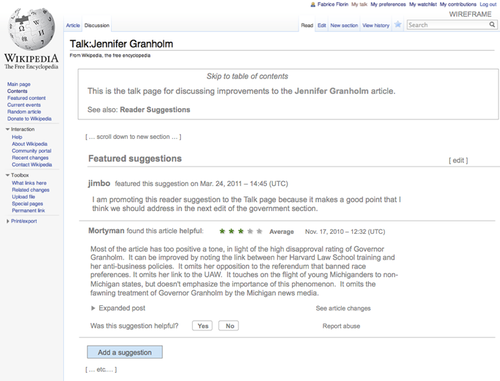| About | Wikipedia Basics | Getting Started | Let's Edit! | VisualEditor |
What Wikipedia is and what it is not
editWhat Wikipedia is not
edit- Wikipedia is not a dictionary
- Wikipedia is not a publisher of original thought
- Wikipedia is not a soapbox or means of promotion
- Wikipedia is not a mirror or a repository of links, images, or media files
- Wikipedia is not a blog, web hosting service, social networking service, or memorial site
- Wikipedia is not a directory
- Wikipedia is not a manual, guidebook, textbook, or scientific journal
- Wikipedia is not a crystal ball
- Wikipedia is not a newspaper
- Wikipedia is not an indiscriminate collection of information
- Wikipedia is not censored
What Wikipedia is: Five Pillars of Wikipedia
editThe fundamental principles of Wikipedia may be summarized in five "pillars":

Wikipedia is written from a neutral point of view: We strive for articles that document and explain major points of view, giving due weight with respect to their prominence in an impartial tone. We avoid advocacy and we characterize information and issues rather than debate them. In some areas there may be just one well-recognized point of view; in others, we describe multiple points of view, presenting each accurately and in context rather than as "the truth" or "the best view". All articles must strive for verifiable accuracy, citing reliable, authoritative sources, especially when the topic is controversial or is on living persons. Editors' personal experiences, interpretations, or opinions do not belong.



Why Wikipedia is important to libraries and cultural institutions
edit- Elder, Danielle, R. Niccole Westbrook, and Michele Reilly. 2012. “Wikipedia Lover, Not a Hater: Harnessing Wikipedia to Increase the Discoverability of Library Resources.” Journal of Web Librarianship 6 (1): 32–44.
- Szajewski, Michael. 2013. “Using Wikipedia to Enhance the Visibility of Digitized Archival Assets.” D-Lib Magazine 19 (3/4).
- “From Audience to Authorship to Authority: Using Wikipedia to Strengthen Research and Critical Thinking Skills | ACRL 2013 Virtual Conference.” 2015. Accessed October 14. http://www.learningtimes.net/acrl/2013/from-audience-to-authorship-to-authority-using-wikipedia-to-strengthen-research-and-critical-thinking-skills/.
The Anatomy of a Wikipedia Page
editHow to Navigate - The Tabs
editYou may not have even noticed but the tab you usually see by default when on Wikipedia is Article.

Talk pages - Why they are important
edit
Tabs for Editing
editThe main tabs are Read, Edit, Edit Source and View History

